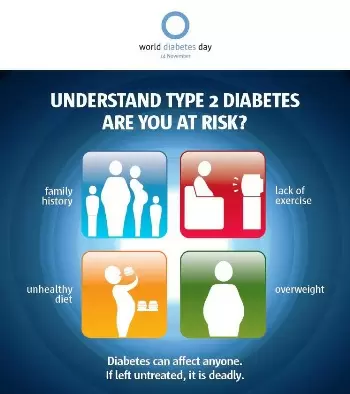‘You are fortunate to be a diabetic living in India’

05-November-2012
Vol 3 | Issue 44
An estimated 62.4 million live with diabetes in India, and an even larger number are presently in the pre-diabetic state. This makes it vital for everybody to understand how to manage this ubiquitous condition.
About 14 years ago I was diagnosed to be a diabetic. During an informal chat, these were some of the questions put to me at that time by a senior diabetes specialist: What are your stress levels? What are your stress factors? Do you face stress in your daily life? How good or bad is your marriage?
 |
|
An estimated 62.4 million live with diabetes in India (Photo: Taru Bahl WFS)
|
Not having given much thought to stress and its impact on my life, I was taken aback and just sat there and stared at the questioner with a blank expression. But those questions forced me to introspect.
I carefully went through the various stress factors in my life and their offshoots. And, yes, there was certainly incompatibility in my marriage and that, perhaps, was a major source of the tension, stress and sadness I was experiencing.
Since then I have met several diabetologists and all of them recognise that ‘bad vibes’ at home, or close proximity to a partner you cannot relate to or bond with, could pave the way for stress, which in turn manifests itself in various ways – and in varying physical disorders.
In fact, one of the most commonplace sources of stress comes from the very home you live in, although we generally attribute our stress to factors more distant. The confines of an ill matched and incompatible marriage can be as stressful as physical imprisonment.
Or as Delhi-based cardiologist Dr Bimal Chajjar, who works to settle and cure lifestyle-related disorders and diseases through changes in living and eating patterns, puts it, “Almost half of the diabetics who come to my clinic are victims of stress and stressed-out living patterns and lifestyles. Also, almost 50 per cent of them develop heart problems.”
A doctor working with him, Dr Maahee Shandilya, elaborates, “Anything that triggers off stress has to be tackled - be it a bad marriage, the loss of a companion or negativity at the workplace or home. Until the source of the stress is faced and addressed, it will continue to affect the patient.”
Anger control is another important requirement, according to Shandilya, “We always tell our patients to try to communicate calmly, without getting worked up and unduly excited, even in the most adverse of circumstances.”
The loss of a companion or the death of a spouse is certainly a development that can trigger diabetes, especially in ageing women. Two women – both in their 60s – introduced to me by Shandilya had strikingly similar responses to such loss.
Says Pramila Shukla, 65, based in Bhopal, “My blood sugar levels rose and heart-related complications set in almost from the day my spouse passed away.” Delhi-based housewife, G. Devi, whose health gave way after her husband of many years passed away, also went through a similar experience.
If older women, who have experienced several adverse experiences in the course of their life, find themselves as emotional wrecks after tragic events, you can well imagine what an average working woman would be going through, having to negotiate not just the stresses at home, but those at the workplace.
Most of us are not adept at doing the balancing act between the various demands being made on us and drawing the line when things get too tough to cope. This is probably why the number of women getting affected by diabetes is on the rise.
Of course, the genetic factor also comes into the picture but when stress and tension come together they act as triggers for disorders in even relatively young women. In fact, until the sources of stress and tension are tackled, blood sugar cannot be managed easily.
The prescribed medication may bring about temporary relief but if the relief has to be long term then it would demand a change in lifestyle, control of weight and, of course, management of stress.
When I was first diagnosed with diabetes, I decided to shed weight immediately. This meant, most of all, keeping sugar and oils, as well as rice and dairy products at bay. Cucumbers and curd, soups and daals and besan-based curries now became part of my regular diet.
I also found that chewing on Jamun and guava leaves, as well as consuming soaked methi (fenugreek) seeds was useful. As for tea, I drank several cups of it, but without milk and sugar. Over time, I shed weight and people began to compliment me on the way I looked.
 |
|
Sustained stress and an unhealthy diet can increase the risk of diabetes. (Courtesy: worlddiabetesday.org)
|
This gave me the confidence to take on the diabetes onslaught. Together with the change of diet came the long daily walks. They are absolutely essential for diabetic patients and need to be followed religiously, even if it is pouring outside.
If the parks and roads are flooded, walk inside the confines of your home by all means, but walk you must. I find walking by myself very therapeutic. It is the time in the day I keep to introspect. Sometimes I even hum while I walk, so that I don’t even notice the exertion entailed.
Remember there is more than one way to handle diabetes, and with the advice of your doctor and knowledge about your body, you can set a regular regime for yourself. I have been fortunate to have the advice of diabetologist Dr G.P. Sharma, who made me see the positive side of even a condition like diabetes.
As he once told me, loud and clear, “You are fortunate to be a diabetic living in India. There are so many herbs, flowers and leaves, which could be antidotes.” He then introduced me to the medical benefits that lie hidden in neem and jamun leaves, methi seeds, cinnamon, turmeric, and that commonplace vegetable, lady’s fingers (bhindi).
This advice literally proved to be a life saver. It made me realise that you don’t have to be rich to cope with diabetes. The only investment you have to make is in a good pair of walking shoes – and perhaps a portable music system to help you cope with stress!
Chajjar echoes Sharma’s advice. He adds, “Remember, there is ‘no fasting and no feasting’ for a diabetic. And, yes, a positive attitude to life helps you go a long way!” - Women's Feature Service)














